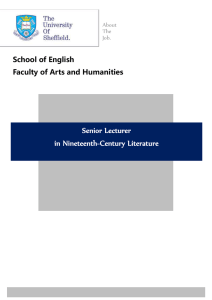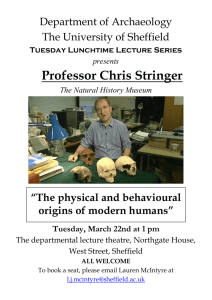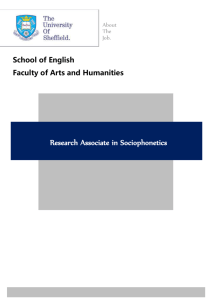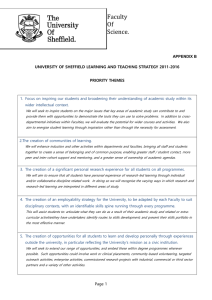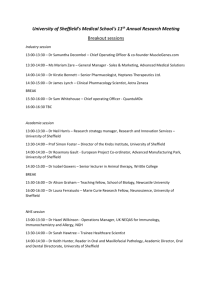Lecturer in Nineteenth-Century Literature School of English Faculty of Arts and Humanities
advertisement
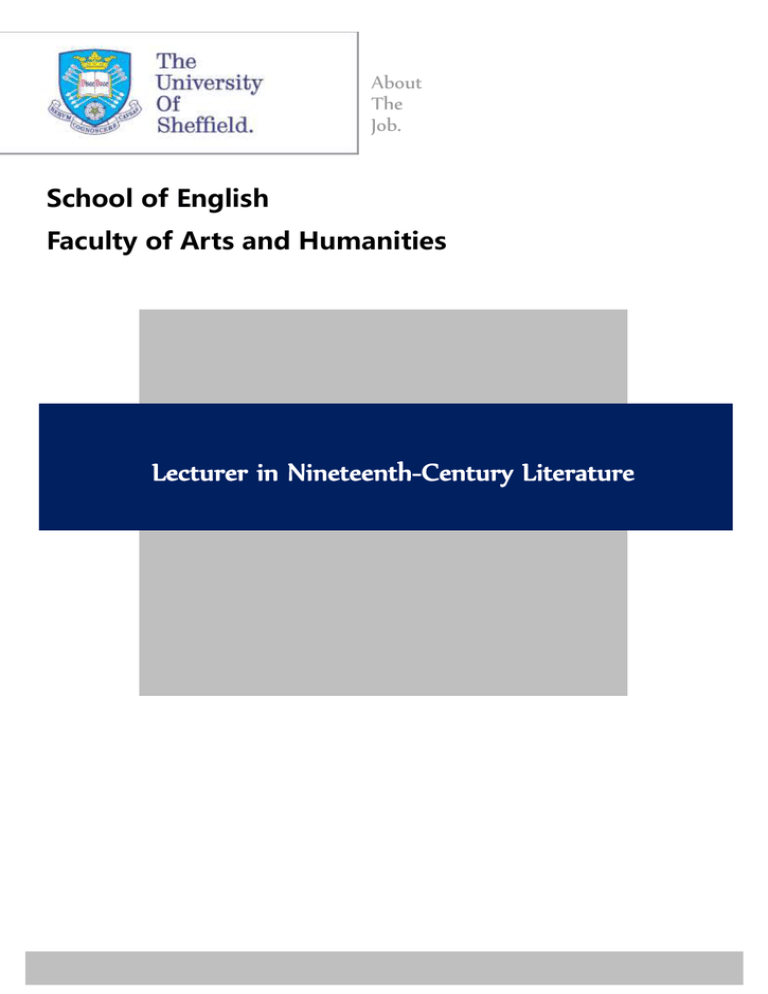
About The Job. School of English Faculty of Arts and Humanities Lecturer in Nineteenth-Century Literature About The Job. Pursue the extraordinary Overview About the Department The Faculty of Arts and Humanities at the University of Sheffield is one of the leading centres for research in the arts and humanities in the UK. The University of Sheffield is a member of the Russell Group of research-intensive universities and is currently ranked 8th in the UK in the Shanghai Jiao Tong Academic Ranking of World Universities. The 2008 Research Assessment Exercise (RAE) ranked the University 5th in the UK in terms of the number of subject areas with 50% or more of their research judged to be ‘world-leading’ (4*) or ‘internationally excellent’ (3*). The performance by the Arts and Humanities in RAE 2008 was particularly impressive with 9 out of our 10 subject areas having 50%+ of their research in the 4* and 3* categories. We have an international reputation for high-quality and innovative learning and teaching, delivered by staff who are both committed to providing an outstanding student experience and who are at the cutting edge of research in their own disciplines. The University of Sheffield has been awarded the Times Higher Education University of the Year for 2011, and Arts and Humanities is a major contributor to this success. The Faculty comprises the following departments: Archaeology Biblical Studies History School of English Literature, Language and Linguistics School of Languages and Culture Music Philosophy Six of the seven units are located in the Jessop quarter of the university campus, adjacent to the award-winning Humanities Research Institute. The Faculty has its own governance structures and is one of the five faculties of the university. Colleagues in the School of English Literature, Language and Linguistics are known for their international-quality research in English Literature, Theatre and Performance, Creative Writing, Applied Linguistics, Literary Linguistics, Cultures of the British Isles and English Language. And much of this activity is passed onto students through our research-led approach to learning and teaching. With over 50 members of academic staff, the School of English is able to offer outstanding teaching across a wide range of subject areas. In recent years five members of staff have received Senate Awards for Teaching Excellence, and one of our staff has been awarded a National Teaching Fellowship. The School is housed in a new Faculty of Arts building which features modern flexible learning, teaching and research facilities - and a cafe. The School of English plays an active role in the local community, and our students are encouraged to venture outside the University to see how some of the ideas they are learning about can apply in the wider world. We have excellent links with local schools, libraries and museums, and we regularly undertake a range of different projects and activities in partnership with these organisations. Job Role As a Lecturer in Nineteenth-Century Literature you will offer teaching at undergraduate and Master of Arts (MA) level across the whole of the long nineteenth century (1789-1945) and will carry out research of substantial external reputation in line with the research strategy of the School. The post-holder will develop approved module options in the period and will contribute to the MA in Nineteenth Century Studies and the MA in English Literature. You will also be involved in the recruitment and supervision of doctoral students. The appointed Lecturer will contribute to teaching at Masters level, and be expected to undertake a suitable administrative role in addition to demonstrating outreach and public engagement activities. Job Description Main Duties and Responsibilities Complement and enhance the English Literature Programme’s existing research strengths by developing a strong international research profile (RAE 2008 2*-4*), with research-led publications. Enhance and maintain a high national and international reputation both individually, and for the English Literature Programme, University and discipline. Teach and examine in his/her specialist area and related areas within the English Literature Programme and School, and to develop new undergraduate modules and programmes where required. Contribute to the operation of the English Literature Programme and School through appropriate administrative responsibilities and committee memberships, and where necessary to represent the English Literature Programme, School and discipline within the University. Represent his/her specialist area, and the interests of the English Literature Programme, School and University at a national and international level. Contribute fully as teacher, researcher and leader, in fulfilment of the ideals of the ‘Sheffield Academic’ (document attached in E-recruitment). Deliver teaching and undertake assessments of modules. This will include preparing teaching material, communicating material and encouraging critical engagement with it; observing and reacting to student interventions; responding to questions outside class times and introducing innovative teaching methods as appropriate. Supervise students’ projects and dissertations. Undertake course evaluation, including facilitating student feedback, reflecting on own teaching design and delivery; and implementing ideas for improving own performance. Undertake curriculum development work, planning, development and evaluation of courses and course materials, and supervise course provision. Attend to the pastoral needs of students. Conduct personal research, of substantial external reputation in line with the research strategy of the School. This includes identifying literature and updating own knowledge; assessing the validity of the relevant literature and its contribution to the development of own field. Disseminate research findings through internationally recognised peer reviewed publications outputs and conferences. Identify appropriate sources of funding and prepare research proposals for funding bodies. Participate in the administrative processes of the School including committee membership, quality assurance procedures and recruitment and admission of students. Contribute to the Faculty’s knowledge transfer and civic engagement agenda. Involvement in professional activities such as refereeing papers, editing journals, refereeing research grants, external examining, organising conferences, committee membership and involvement with professional bodies on accreditation. Working collaboratively with colleagues, actively participate in School/Faculty/University committees in order to contribute to the development of teaching/learning and research policy. Respond appropriately, promptly and proactively to requests and issues relating to teaching, supervising research staff and students and administration. Teaching-related and administrative work is allocated by the Head of School and various committees. Self-generate work through research and scholarly pursuits and through innovation in teaching and administration Plan and prioritise own daily work, and forward plan up to five years for some tasks. For teaching, plan up to one year ahead unless there are significant teaching programme changes or new courses, then plan for up to two years ahead of their introduction. Deal with reactive requests daily such as those relating to teaching, supervising research staff and students and administrative tasks. Delegate to and monitor the work of research students as appropriate. Any other duties commensurate with the grade of the post. Person Specification Applicants should provide evidence in their applications that they meet the following criteria. We will use a range of selection methods to measure candidates’ abilities in these areas including reviewing your on-line application, seeking references, inviting shortlisted candidates to interview and other forms of assessment action relevant to the post. Criteria Essential Desirable Qualifications and experience 1. Have a good first degree (or have equivalent experience) in a X relevant subject area. 2. Have or be close to completing a PhD (or equivalent experience) X in a relevant subject area e.g. nineteenth-century prose, the Victorian novel or literature and culture from the fin de siècle to modernism. 3. Proven ability to carry out high quality research and disseminate X research findings. 4. Ability to demonstrate some record of quality peer reviewed X research publications. 5. Possess teaching experience, ideally with a teaching X qualification. 6. Ability to offer teaching at undergraduate and MA level across X the whole of the long nineteenth century (1789-1945). 7. Demonstrate the potential to enhance the students’ learning X experience. 8. Ability to supervise and monitor the work of research students. 9. Ability to demonstrate previous experience of outreach and X X public engagement. Communication skills 10. Effective communication skills, both written and verbal, report X writing skills and experience of delivering presentations. 11. Excellent interpersonal skills with the ability to liaise effectively X with colleagues, students and others in the University and beyond. 12. Possess the ability to communicate complex theories and X problems effectively to undergraduate and postgraduate students. Team working 13. Experience of working effectively on a collaborative basis. X 14. Experience of creating and maintaining a network of contacts X throughout own work area. Problem solving and decision making 15. Ability to think strategically and innovatively. X 16. Ability to analyse and solve problems with an appreciation of X longer-term implications. Project management 17. Experience of managing projects, people and resources. X Personal effectiveness 18. Proven ability to work to and meet deadlines. 19. Experience of developing and maintaining a network of contacts X X in own area. Further Information This post is open ended. This post is full-time: This role has been identified as a full-time post, but we are committed to exploring flexible working opportunities with our staff which benefit both the individual and the University. Therefore, we would consider flexible delivery of the role subject to meeting the business needs of the post. See www.sheffield.ac.uk/hr/wellbeing/info/wlb.html for more information. Benefits Terms and conditions of employment: Will be those for Grade 8 staff. Salary for this grade: £37,756 - £45,053 per annum. Potential to progress to £50,688 per annum through sustained exceptional contribution. More details on salaries, terms and conditions and our wide range of benefits for staff are available at www.sheffield.ac.uk/hr/reward/structures Closing date: XXX Informal enquiries: For all on-line application system queries and support, contact: e-Recruitment@sheffield.ac.uk . For informal enquiries about this job and department, contact: Selection-Next Step Following the closing date, you will be informed by email whether or not you have been shortlisted to be invited to participate in the next stage of the selection process. Please note that due to the large number of applications that we receive, it may take up to two working weeks following the closing date before the recruiting department will be able to contact you. The University of Sheffield is committed to achieving excellence through inclusion. The University of Sheffield is proud to be a Two Ticks employer www.sheffield.ac.uk/hr/equality/support/twoticks/ Pursue the extraordinary
